As parents, we all want to ensure the best care and health for our little ones, and choosing the right drinking water is an essential part of their daily routine. The quality of water can significantly impact their growth and development, and as such, being well-informed about the different options available is crucial. With various options available, deciding between purified and distilled water for babies can be overwhelming. While both are considered safe options, there are some differences that parents should be aware of before making a decision. Understanding the distinctions between the two, their benefits and drawbacks, and overall safety is essential for navigating the world of baby water choices confidently.
In this blog post, we will delve deeper into both purified and distilled water choices. We aim to explore their definitions, benefits, drawbacks, and safety considerations for your precious little one. We believe that by comparing these two options, we’ll provide you with all the necessary information, allowing you to make an informed decision that best fits your baby’s health needs. So keep reading to learn more about these varying water options and determine which one is the most suitable for your growing family’s needs.
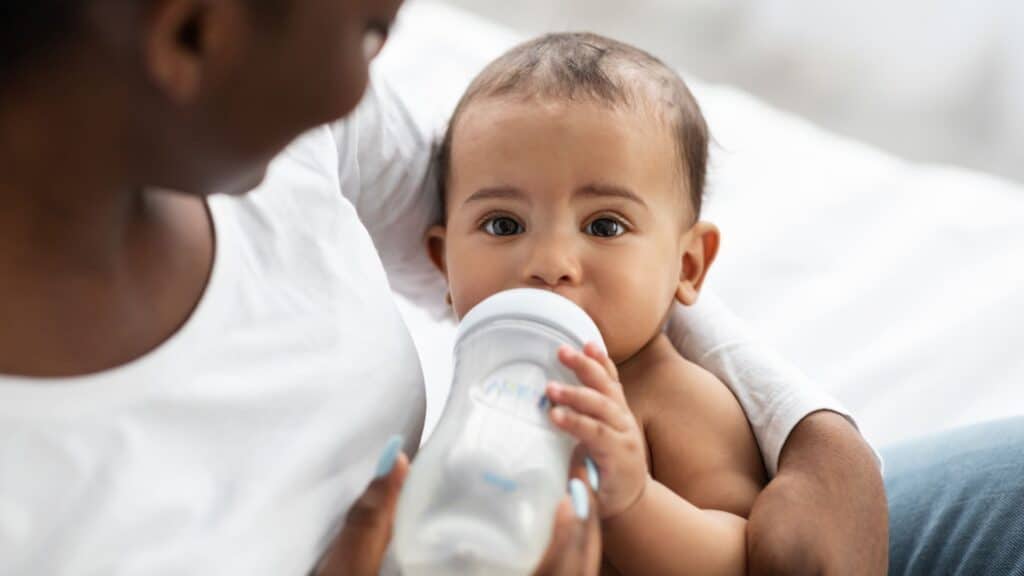
Purified Water for Babies
Purified water is a type of water that has been filtered and treated to remove impurities, chemicals, and contaminants. This process ensures that the water is clean, safe, and free of any harmful substances.
Several methods of purifying water include distillation, deionization, reverse osmosis, and carbon filtering.
How is Purified Water Made?
Purified water is made through various processes that remove impurities, contaminants, and chemicals from the water. Some common methods include:
- Distillation: Water is heated to its boiling point, and the steam is collected and cooled back into liquid form, leaving behind impurities.
- Deionization: Water is passed through ion exchange resins that remove mineral ions, resulting in demineralized water.
- Reverse Osmosis: Water is forced through a semipermeable membrane, which removes contaminants and impurities.
- Carbon filtering: Water is passed through activated carbon filters that remove impurities, chemicals, and contaminants.
Each of these methods can produce purified water, but the specific process varies depending on the method used and the desired purity level.
Is Purified Water Safe for Babies?
Purified water is generally safe for babies, as it has undergone treatment to remove impurities and contaminants. However, it is essential to consult with a pediatrician before changing a baby’s water source, as certain minerals and nutrients found in tap water may benefit a baby’s growth and development.
When it comes to preparing infant formula, using purified water can offer additional benefits and peace of mind for parents. Since infant formula is a crucial source of nutrition for babies who are not exclusively breastfed, ensuring that the water used in the preparation is free from contaminants is essential.
Benefits of Using Purified Water for Preparing Infant Formula:
Reduced risk of contamination: Utilizing purified water in infant formula preparation minimizes the chances of introducing harmful substances, such as lead or bacteria, into the formula, providing a safer feeding option for babies.
Consistent quality: Purified water offers a consistent level of quality and safety, which is important for parents who want to ensure their babies receive the best nutrition possible.
Better taste: As purified water often tastes better than tap water, using it in the formula can result in a more pleasant taste, potentially encouraging the baby to consume more formula.
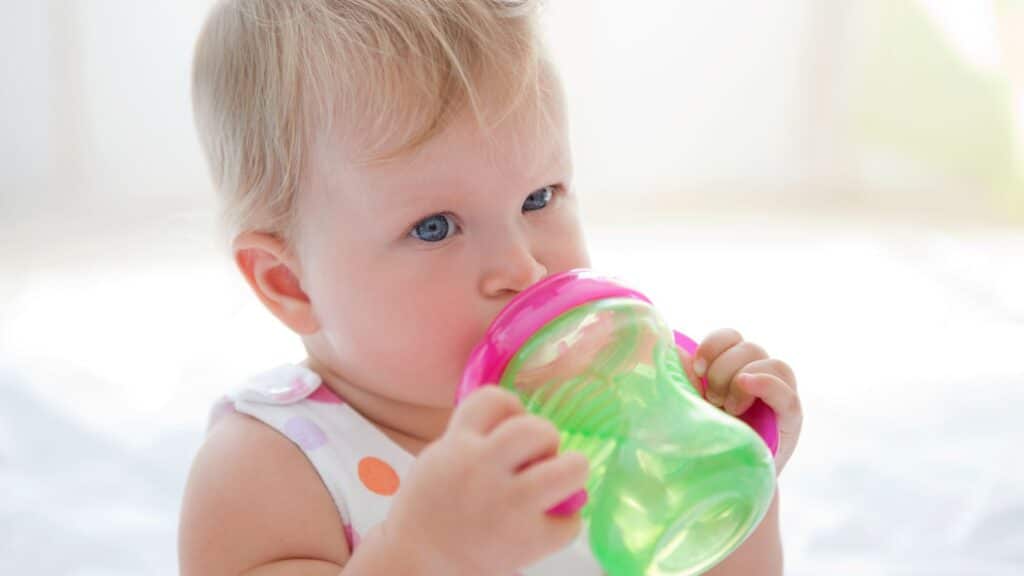
Distilled Water for Babies
As new parents, wanting the best for your baby is natural. One question often asked is whether distilled water is safe and appropriate for babies.
Distilled water is a type of purified water with impurities and minerals removed through distillation. Distillation involves boiling the water and collecting the steam, which condenses into water, leaving behind dissolved solids and other impurities.
How is Distilled Water Made?
The process of making distilled water involves several steps:
- Heating: Water is heated to its boiling point, turning it into steam.
- Evaporation: The steam rises, leaving behind impurities and dissolved solids.
- Condensation: The steam is collected and cooled, returning it to water.
- Collection: The condensed water is collected, now free of impurities and minerals.
Is Distilled Water Safe for Babies?
Yes, distilled water is safe for babies and is often recommended when preparing infant formula, especially for infants under six months old. This is because distilled water is free of contaminants and excess minerals that may be found in tap or well water. However, it’s essential to consult with your pediatrician before changing your baby’s feeding routine or using distilled water to prepare infant formula.
Benefits of Using Distilled Water for Babies:
- Purity: Distilled water is free of impurities and minerals, ensuring a clean and safe water source for mixing with baby formula or for baby consumption.
- Reduced Risk: Using distilled water can help minimize the risk of exposure to harmful contaminants, such as lead or bacteria, which may be present in tap water.
- Consistency: Because distilled water has a consistent composition, it can help maintain the proper balance of nutrients in baby formula.
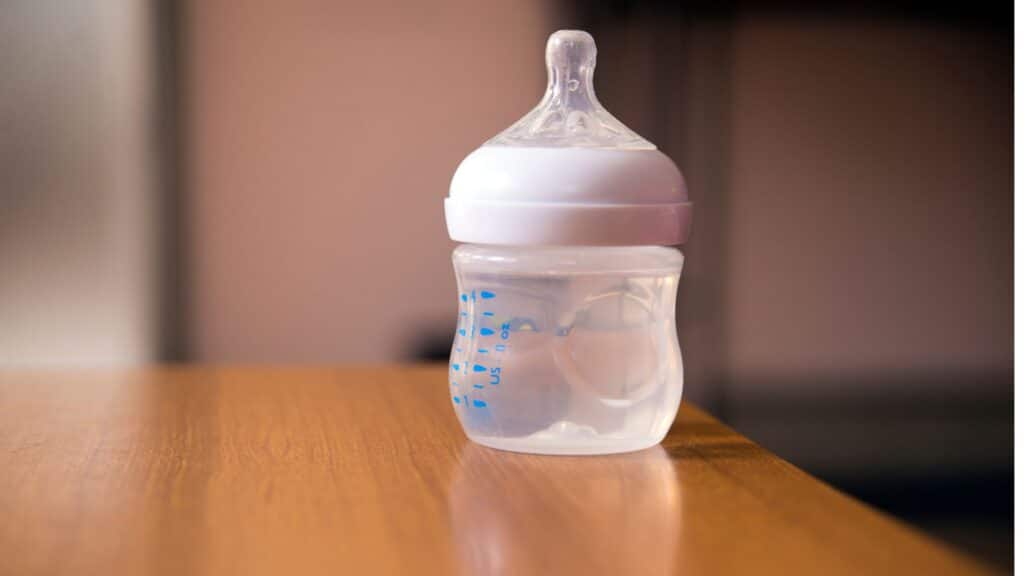
Tips for Preparing Infant Formula with Water
When it comes to mixing your baby’s formula, distilled water can be an excellent choice due to its purity and consistent composition. This can help ensure that your baby receives the proper nutrients and minimize potential risks from contaminants that may be present in tap water.
- Always follow the formula manufacturer’s instructions: Adhere to the specific measurements and guidelines provided by the infant formula manufacturer to ensure the correct nutrient balance and avoid over- or under-feeding your baby.
- Use the appropriate water temperature: Warm distilled water (around 70°F or 21°C) is ideal for mixing formula, as it helps dissolve the powder more effectively. Avoid using boiling water, as it may destroy essential nutrients in the formula.
- Cool the boiled distilled water to the right temperature: If you choose to boil distilled water before mixing the infant formula, be sure to let it cool to around 70°F (21°C) before using it to mix the formula. This temperature is safe and effective for dissolving the formula powder.
- Store prepared formula safely: Once mixed, store the prepared formula in the refrigerator for no more than 24 hours. Discard any remaining formula after this time to minimize the risk of bacterial contamination.
- Consult with your pediatrician: As always, consult with your pediatrician before changing your baby’s water source or making any significant changes to their feeding routine. They can provide personalized guidance based on your baby’s specific needs.
Distilled water can be a safe and reliable choice for mixing infant formula, as it is free of impurities and minerals, ensuring a clean and consistent water source for your baby.
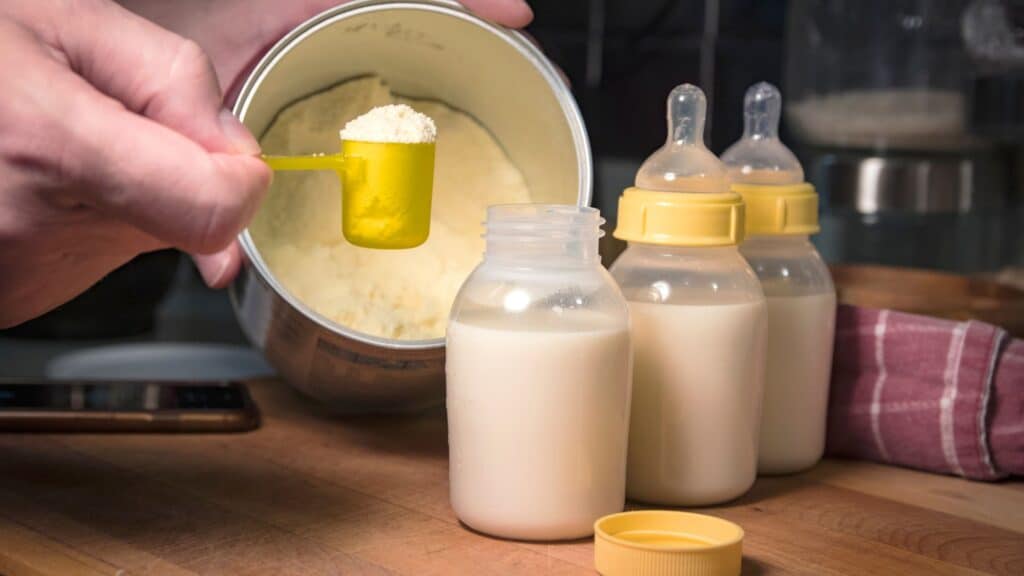
Comparison Between Purified and Distilled Water for Babies
Parents often wonder whether they should use distilled or purified water for their little ones.
Here are the differences between the two:
Differences between Purified and Distilled Water
- Purification process: Purified water has undergone various filtration and purification processes to remove contaminants, impurities, and harmful microorganisms.
- Mineral content: Distilled water has almost no minerals, as the distillation process removes them and impurities. Depending on the purification method used, purified water may retain some essential minerals.
- Taste: Distilled water tends to have a flat or bland taste due to lacking minerals, while purified water may have a more refreshing taste.
Which One is Better for Babies?
There’s no definitive answer as to which type of water is better for babies, as purified and distilled water can be safe for consumption. However, some pediatricians recommend using distilled water for mixing with baby formula since it has a lower risk of containing contaminants.
Factors to Consider while Choosing between Purified and Distilled Water
- Source: Ensure that your water comes from a reputable source and meets the required quality standards.
- Fluoride content: Fluoride is essential for healthy teeth development, but too much fluoride can be harmful. Check the fluoride content in your water and consult your pediatrician about the appropriate levels for your baby.
- Availability: Depending on your location, one type of water may be more easily accessible. Choose the option that is readily available and convenient for you.
- Cost: Distilled water can be more expensive than purified water. Consider your budget when making your choice.
Precautions to Take while Giving Purified or Distilled Water to Babies
- Sterilization: Ensure all bottles, nipples, and other feeding equipment are properly sterilized before each use.
- Storage: Store water in a clean, covered container and avoid prolonged storage, as bacteria can grow over time.
- Expiry: Use water within the recommended expiration date to ensure freshness and safety.
- Consult your pediatrician: Always consult your pediatrician before introducing any new type of water to your baby’s diet.
Both purified and distilled water can be suitable for babies when properly sourced and prepared, with low fluoride bottled water being a viable option to consider.
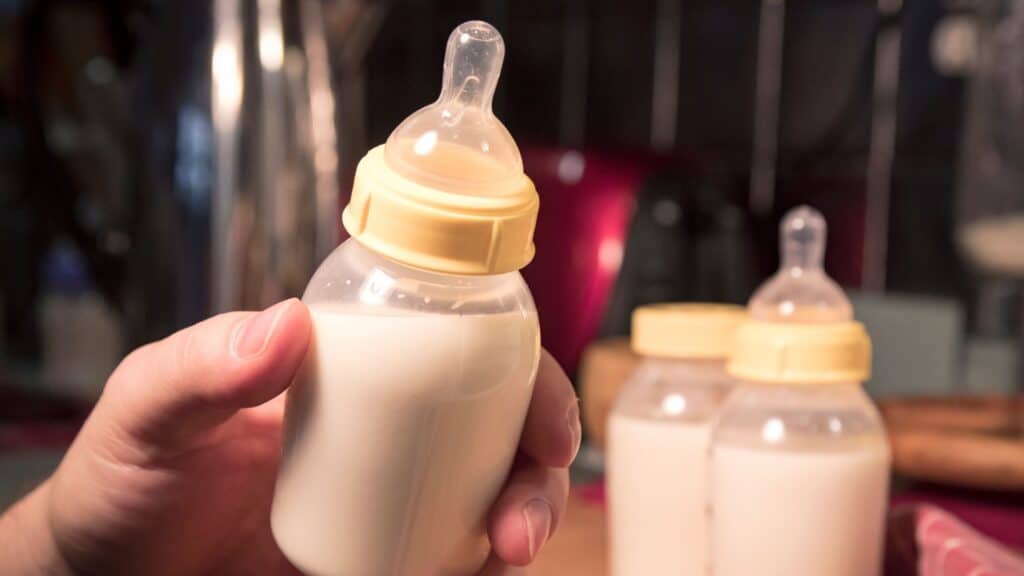
Alternatives to Purified and Distilled Water for Babies
While purified and distilled water are popular choices for mixing baby formula or preparing baby food, other types of water available in the market can serve as alternatives. Each type of water has its advantages and disadvantages, and it’s essential to weigh these factors before deciding.
Spring Water:
Spring water is sourced from natural springs and undergoes minimal processing, retaining its natural minerals. It is usually free of contaminants and has a fresh taste.
Advantages:
- It contains natural minerals that are beneficial for the baby’s growth and development
- Less processed as compared to purified and distilled water
Disadvantages:
- Mineral content may vary depending on the source
- It may contain trace amounts of contaminants or bacteria
Precautions:
- Ensure the spring water is from a reputable brand and meets safety standards
- Always check the expiration date and store it in a cool, dark place
Nursery Water:
Nursery water, also known as baby water, is a type of water marketed explicitly for use in preparing baby formula or food. It is typically purified or distilled water with added minerals or fluoride.
Advantages:
- It contains added minerals that support the baby’s growth and development
- Fluoridated nursery water can help prevent tooth decay in babies
Disadvantages:
- More expensive than other types of water
- Fluoride levels may be a concern for some parents
Precautions:
- Choose a trusted brand that adheres to safety standards
- Consult with a pediatrician about appropriate fluoride levels for your baby
Tap Water:
Fluoridated tap water is readily available and may be suitable for preparing baby formula or food, depending on the water quality in your area.
Advantages:
- Easily accessible and cost-effective
- It may already contain fluoride and other minerals
Disadvantages:
- It can contain contaminants or high levels of minerals that may not be suitable for babies
- Chlorine used for disinfection may alter the taste
Precautions:
- Check the quality of tap water in your area and, if needed, use a water filter to remove impurities
- Boil tap water for approximately one minute and let it cool before using it to mix infant formula or prepare infant food.
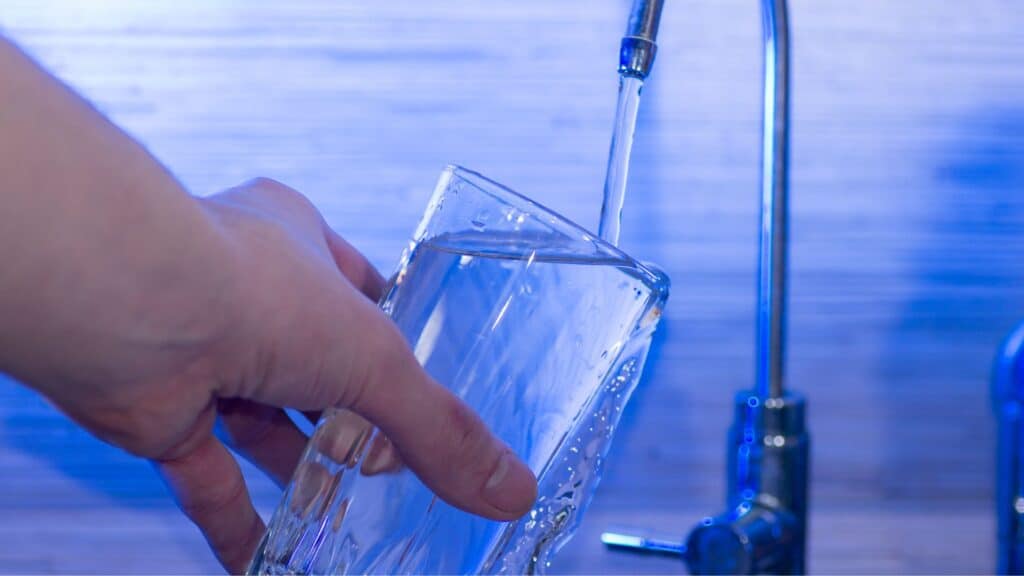
Expert Opinions and Recommendations
Expert opinions and recommendations are important to the topic and can provide valuable insights for parents or caregivers when deciding on the best water for baby formula. Here is a summary of the expert opinions and recommendations:
1. Pediatricians’ Perspectives
Pediatricians generally recommend using purified or distilled water for mixing liquid concentrate formula or powdered formula to ensure the water is free from contaminants.
They may also recommend using water fortified with essential minerals to support infants’ growth and development.
2. Insights From Baby Care Specialists
Baby care specialists often recommend using purified water designed for infants, as it is free from contaminants and contains the necessary minerals for healthy growth and development.
They may also suggest boiling tap water and letting it cool before mixing liquid concentrate formula or powdered formula as an alternative to purified or distilled water.
Precautions for Tap Water Usage
- Test your tap water: If you plan to use tap water for your baby, have it tested for contaminants, such as lead, bacteria, and nitrates. This can help you determine if additional filtration or purification is necessary for preparing the baby’s formula.
- Install a water filter: If your tap water contains contaminants, consider installing a certified water filter to remove the specific impurities in your water.
- Run the tap before use: When using tap water, run the tap for a few seconds before collecting the water to flush out any contaminants that may have accumulated in the pipes.
- Avoid using hot tap water: Do not use hot tap water for preparing water for baby formula, as it can contain higher contaminants. Always use cold tap water and heat it separately if needed.
- Consider low-fluoride bottled water: If you are concerned about tap water quality, low-fluoride bottled water can be a safer alternative for preparing your baby’s formula.
By following these practical tips and guidelines, you can ensure that the water you provide for your baby is safe, clean, and suitable for their needs.
Exploring the Use of Natural Spring Water for Babies
Natural spring water is another alternative to consider when choosing the right water for your little ones. Originating from an underground source and naturally filtered by the earth, spring water typically contains essential minerals like calcium, potassium, and magnesium, which are vital for your baby’s growth and development.
While they occur naturally, these minerals must still be balanced to ensure they don’t exceed safe levels for infants. Hence, not all spring water on the market is suitable for babies. Always choose spring water specially designed for infants. These are usually carefully sourced and processed to the highest standards, ensuring their safe mineral composition and absence of contaminants.
Moreover, natural spring water is generally considered crisp and fresh to the taste, which, over time, might make a difference in encouraging your little one to stay hydrated. However, it’s important to remember that even the purest natural source can be affected by environmental factors. Therefore, appropriate treatment, such as UV radiation or micron filtration, is applied to eliminate any potential contaminants, including bacteria or viruses.
There are also eco-friendly advantages to consider. The process of bottling natural spring water requires less filtration and thus less energy compared to purified water, leading to a smaller carbon footprint.
Taking into consideration the freshness, benefits of natural minerals, and the green aspect, spring water could be a suitable choice for your baby. Still, it’s essential to consult with pediatricians or healthcare professionals before making a switch to ensure it aligns with your baby’s health needs and dietary requirements.
While distilled and purified water are safe choices for your baby, exploring the option of natural spring water is valuable for its unique benefits. When it comes to deciding the best for your child, remember safety is paramount, and any decision should prioritize their health needs over anything else.
Conclusion
Choosing between purified, distilled, and fluoridated water for babies can be quite challenging, especially considering that each option presents its unique benefits and drawbacks. This choice isn’t easy but ultimately depends on personal preference and sound advice from a trusted pediatrician. Purified water provides clean and consistent quality, which is vital for infant feeding. However, it may lack the essential minerals usually found in common tap water. By contrast, distilled water is completely free of impurities and unnecessary minerals, making it a favored option for mixing with baby formula. Still, it does not contain fluoride, an element crucial for healthy teeth development.
Regardless of the water type chosen, it cannot be stressed enough that maintaining the safety and cleanliness of water used for baby consumption is paramount. Babies have a developing immune system, and the choice of their water source could significantly impact their growth, development, and overall health. The key considerations should always revolve around providing a water source free of harmful impurities, while still ensuring that it contains the necessary minerals for healthy growth. Through this blog post, we’ve explored the difference between these water varieties to assist you in making an informed choice tailored to your baby’s needs. Please note, the information provided should be supplemented with advice from a healthcare professional considering your baby’s health history and specific nutritional requirements.
Did you find this article helpful? We’d love to hear from you! Have a question? Let us know in the comments.



